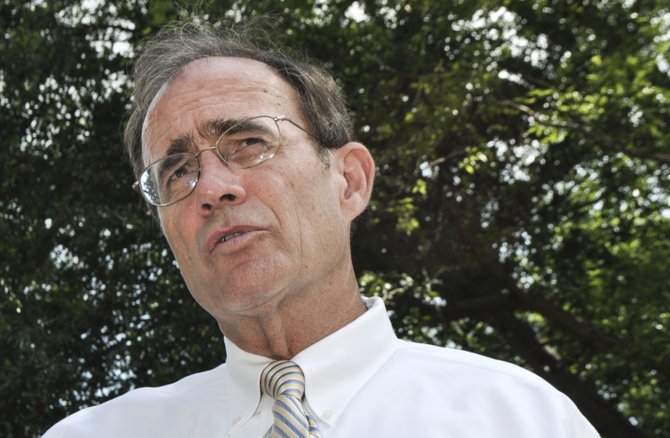Mississippi Secretary of State Delbert Hosemann, who oversees elections, released figures Wednesday afternoon that he said supported his long-held claim that people's voting rights would not be infringed by requiring government-issued photo identification on Election Day. Photo by Trip Burns.
The use of voter ID for the first time in Mississippi has largely been characterized as inconsequential.
One conservative news website noted, accurately, "Voter ID Law in Mississippi Did Not Bring On End of the World," on June 3 in the statewide party primaries. Syndicated columnist Sid Salter wrote: "Despite the predictions of post-apocalyptic turmoil from opponents of adopting a voter identification law in Mississippi, the debut of voter ID in Mississippi in practical application was a non-event. Voters didn't recoil from the process as predicted, and there is no discernible evidence that voter ID had any impact on voter turnout."
Mississippi Secretary of State Delbert Hosemann, who oversees elections, released figures Wednesday afternoon that he said supported his long-held claim that people's voting rights would not be infringed by requiring government-issued photo identification on Election Day.
At a news conference at his Capitol office, Hosemann said 513 citizens had to vote by affidavit ballot because they lacked the required ID. Of that number, approximately 177 returned with their ID cards. State law allows people who submit affidavit ballots because they lack proper ID up to five business days to return to the circuit clerk's office with their identification cards and have their vote counted.
"We were very pleased with the numbers," Hosemann said at the press conference. "Obviously, they show Mississippi is able to conduct its own elections and Mississippians are able to show up with the constitutionally required documents."
Despite the rhetoric of Hosemann, Salter and others, it's not clear whether the voter-ID requirement dampened voter turnout.
The critics of such laws contend that the requirements disproportionately affect poor people, African Americans, Latinos, young people and college students, all of whom tend to vote Democratic.
On June 3, approximately 400,000 people cast votes. Most of those—313,483—were Republicans hoping to decide a heated U.S. Senate primary between incumbent Thad Cochran and state Sen. Chris McDaniel of Laurel.
Only 84,339 people voted in the Democratic primary, in which analysts expected former U.S. Rep. Travis Childers to easily capture his party's nomination for Senate. Interestingly, that number closely mirrored turnout in the 2012 Democratic primary, a presidential election year, which usually sees the greatest voter participation.
Mississippi passed a voter ID law in 2011 through a statewide ballot referendum; the following spring, the Legislature formally made the law part of the state's constitution. Implementation was held for about a year as the state went through the steps of obtaining approval from the U.S. Justice Department.
That ended in the summer of 2013 when the U.S. Supreme Court nullified that approval process, known as preclearance. New York University's Brennan Center for Justice, a leading opponent of voter ID laws, had estimated that 48,000 Mississippians could have trouble obtaining photo identification. Hosemann dismissed that estimate Wednesday, saying he thought that fewer than 2,000 ID cards issued by clerks showed most Mississippians already had ID.
But Larry Norden, deputy director of the Brennan Center's Democracy Program, told the Associated Press that people who may have otherwise voted stayed away.
"That doesn't mean there weren't a lot of people without IDs who didn't vote," he said, although he said such figures are hard to prove.
The Associated Press contributed to this story.



Comments
Use the comment form below to begin a discussion about this content.
comments powered by Disqus